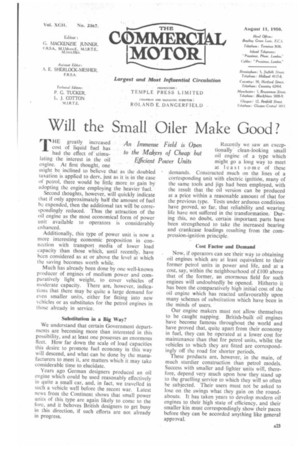Will the Small Oiler Make Good?
Page 25

If you've noticed an error in this article please click here to report it so we can fix it.
riAn Immense k HE greatly increased • cost of liquid fuel has . had the effect of stimuto the makers lating the interest in the oil . Efficient P engine. At first thought, one might be inclined to believe that as the doubled taxation is applied to derv, just as it is in the case of petrol, there would be little more to gain by adopting the engine employing the heavier•fuel.
Second thoughts, however, will quickly indicate that if only approximately half the amount of fuel be expended, then the additional tax will be correspondingly reduced. Thus the attraction of the oil engine as the most economical form of power unit available to operators is considerably enhanced.
Additionally, this type of power unit is now a more interesting economic proposition in connection with transport media of lower load capacity than those which, until recently, have been considered as at or above the level at which the saving becomes worth while.
Much has already been done by one well-known producer of engines of medium power and comparatively light weight, to cover vehicles of moderate capacity. There are, however, indications that there may be quite a large demand for even smaller units, either for fitting into new vehicles or as substitutes for the petrol engines in those already in service.
Substitution in a Big Way?
We understand that certain Government departments are becoming more than interested in this possibility, and at least one possesses an enormous fleet. How far down the scale of load capacities this desire to promote fuel economy in this way will descend, and what can be done by the manufacturers to meet it, are matters which it may take considerable time to elucidate.
Years ago German designers produced an oil engine which could be used reasonably effectively in quite a small car, and, in fact, we travelled in such a vehicle well before the recent war. Latest news from the Continent shows that small power units of this type are again likely to come to the fore, and it behoves British designers to get busy in this direction, if such efforts are not already in progress. Field is Open Recently we saw an excep of Cheap but oil engine of a type which oWer Units might go a long way to meet at least some of these demands. Constructed much on the lines of a cOrtesponding unit with electric ignition, many of the same tools and jigs had been employed, with the result that the oil version can be produced at a price within a reasonable amount of that for the previous type. Tests under arduous conditions have proved, so far, that reliability and. wearing life have not suffered in the transformation: During this, no doubt, certain intpOrtant..parts have been strengthened to take the increased bearing and crankcase loadings resulting from the compression-ignition principle.
Cost Factor and Demand Now, if operators can see their way to obtaining oil engines which are at least equivalent to their former petrol units in power and life, and at a cost, say, within the neighbourhood of £100 above that of the former, an enormous field for such engines will undoubtedly be opened. Hitherto it has been the comparatively high initial cost of the oil engine which has reacted unfavourably upon many schemes of substitution which have been in the minds of users.
Our engine makers must not allow themselves to be caught napping. British-built oil engines have become famous throughout the world and have proved that, quite apart from their economy in fuel, they can be operated at a lower cost for maintenance than that for petrol units, whilst the vehicles to which they are fitted are correspondingly off the road for shorter periods.
These products are, however, in the main, of much sturdier construction than petrol models. Success with smaller and lighter units will, therefore, depend very much upon how they stand up to the gruelling service to which they will so often be subjected. Their users must not be asked to lose on the swings what they gain on the roundabouts. It has taken years to develop modern oil engines to their high state of efficiency. and their smaller kin must correspondingly show their paces before they can be accorded anything like general approval.












































































